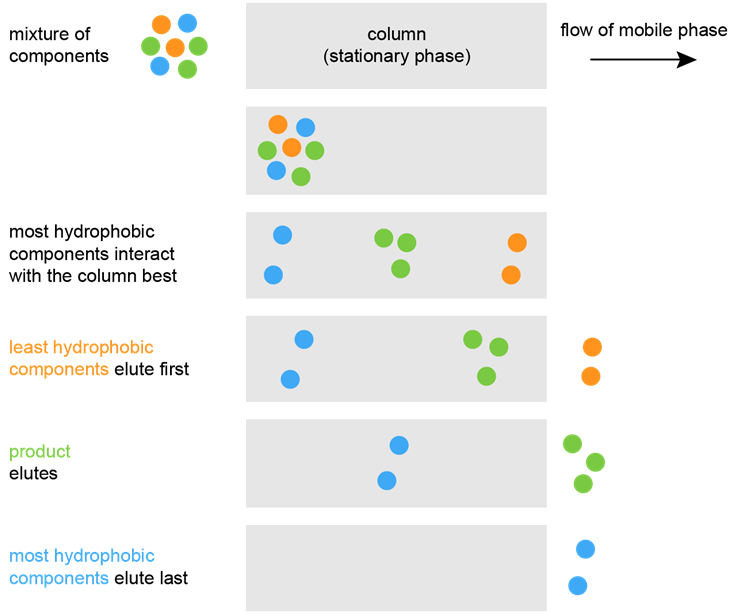Custom Reversed-Phase Chromatography Service
Creative Biostructure provides custom reversed phase chromatography service for advanced biological macromolecule purification programs.
Reversed phase chromatography (RPC) is a special chromatographic method that performs the separation of proteins according to their surface hydrophobicities, which is the same as HIC. Although HIC and RPC are closely related since they based on the same theory, however, their techniques are very different in practice. An RPC medium has a more hydrophobic surface than that of an HIC medium. This leads to a stronger interaction between the RPC medium and the target hydrophobic macromolecule than that of HIC. Researchers have to choose non-polar organic solvents to reverse the interaction and perform the elution successfully, such as acetonitrile or methanol. RPC has the highest resolution among all the chromatographic methods available, it also provides great flexibility for purification conditions. RPC can be used for desalting and concentrating high hydrophobic components, identification of unknown proteins, peptides or nucleotides.
 Figure 1. Reverse Phase Chromatography
Figure 1. Reverse Phase Chromatography
The media of RPC can be categorized into two types, one is based on hydrophobic matrix of silica beads with a hydrophobic phase of carbon chains binding and covering on its surface, another type is based on a certain naked hydrophobic polymer matrix. Samples are applied under the conditions that favor binding, usually using aqueous solutions containing an ion-pairing agent, e.g. trifluoroacetic acid (TFA). When non-bound components have passed through, elution is carried out by increasing the concentration of chosen organic modifier. Gradient elution is performed so that molecules with different hydrophobicity can be eluted differently. Components with the lowest hydrophobicity will be eluted first. On the contrary, molecules with the highest hydrophobicity will be eluted last. Researchers shall be specially noticed that complex enzymes and multi-component proteins are more likely to lose their biological activities because the presents of non-polar organic solvents.
Creative Biostructure now can provide custom RPC purification and identification services with years of experience. Various RPC medium and multiple chromatography systems from both AKTA and Bio-Rad are available to meet different requirements of our customers. Our science team will establish the optimal experimental strategy for each individual case.
We can also provide other chromatography and purification services including but not limited to:
Affinity Chromatography
Ion-exchange Chromatography
Size-Exclusion Chromatography
Hydrophobic Interaction Chromatography
TFF/Diafiltration
Please feel free to contact us to discuss your project!
Ordering process
References
- Chen M H, Horváth C. Temperature programming and gradient elution in reversed-phase chromatography with packed capillary columns [J]. Journal of Chromatography A, 1997, 788(1): 51-61.
- Horvath C, Melander W. Liquid chromatography with hydrocarbonaceous bonded phases; theory and practice of reversed phase chromatography [J]. Journal of Chromatographic Science, 1977, 15(9): 393-404.
- Fausnaugh J L, Kennedy L A, Regnier F E. Comparison of hydrophobic-interaction and reversed-phase chromatography of proteins [J]. Journal of Chromatography A, 1984, 317: 141-155.
